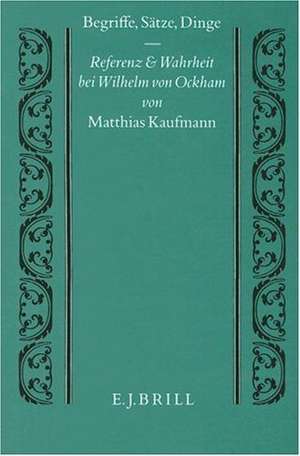Begriffe, Sätze, Dinge: Referenz und Wahrheit bei Wilhelm von Ockham: Studien und Texte zur Geistesgeschichte des Mittelalters, cartea 40
Autor M. Kaufmannde Limba Germană Hardback – 31 oct 1993
Part one contains a presentation of the basic concepts of Ockham's semantics. It is followed by an investigation of his ontology, including a comparison with modern ontology. Part three deals with the common and different elements in the conceptions of supposition and of quantification. Part four shows some similarities of Ockham's views on the truth of sentences with those of Davidson. The final part presents Ockham's epistemology within the discussion of his contemporaries and confronts it with actual issues raised by Quine and Putnam.
Din seria Studien und Texte zur Geistesgeschichte des Mittelalters
- 18%
 Preț: 939.60 lei
Preț: 939.60 lei - 18%
 Preț: 648.77 lei
Preț: 648.77 lei - 18%
 Preț: 680.54 lei
Preț: 680.54 lei - 18%
 Preț: 1129.20 lei
Preț: 1129.20 lei - 18%
 Preț: 1374.32 lei
Preț: 1374.32 lei - 18%
 Preț: 732.02 lei
Preț: 732.02 lei - 18%
 Preț: 1552.99 lei
Preț: 1552.99 lei - 18%
 Preț: 830.58 lei
Preț: 830.58 lei - 18%
 Preț: 1735.91 lei
Preț: 1735.91 lei - 18%
 Preț: 1588.52 lei
Preț: 1588.52 lei - 18%
 Preț: 1061.61 lei
Preț: 1061.61 lei - 18%
 Preț: 737.76 lei
Preț: 737.76 lei - 18%
 Preț: 615.99 lei
Preț: 615.99 lei - 18%
 Preț: 786.41 lei
Preț: 786.41 lei - 18%
 Preț: 956.35 lei
Preț: 956.35 lei - 18%
 Preț: 709.30 lei
Preț: 709.30 lei - 18%
 Preț: 764.02 lei
Preț: 764.02 lei - 25%
 Preț: 827.36 lei
Preț: 827.36 lei - 18%
 Preț: 703.14 lei
Preț: 703.14 lei - 18%
 Preț: 610.42 lei
Preț: 610.42 lei - 18%
 Preț: 636.93 lei
Preț: 636.93 lei - 18%
 Preț: 799.09 lei
Preț: 799.09 lei - 15%
 Preț: 530.25 lei
Preț: 530.25 lei - 18%
 Preț: 649.97 lei
Preț: 649.97 lei - 18%
 Preț: 625.24 lei
Preț: 625.24 lei - 18%
 Preț: 704.35 lei
Preț: 704.35 lei - 18%
 Preț: 532.13 lei
Preț: 532.13 lei - 15%
 Preț: 472.13 lei
Preț: 472.13 lei - 18%
 Preț: 901.57 lei
Preț: 901.57 lei - 18%
 Preț: 1216.43 lei
Preț: 1216.43 lei - 15%
 Preț: 529.41 lei
Preț: 529.41 lei - 18%
 Preț: 550.10 lei
Preț: 550.10 lei - 18%
 Preț: 857.82 lei
Preț: 857.82 lei - 18%
 Preț: 1144.80 lei
Preț: 1144.80 lei - 18%
 Preț: 719.96 lei
Preț: 719.96 lei - 18%
 Preț: 1363.80 lei
Preț: 1363.80 lei - 18%
 Preț: 1072.61 lei
Preț: 1072.61 lei - 18%
 Preț: 1351.52 lei
Preț: 1351.52 lei - 18%
 Preț: 957.73 lei
Preț: 957.73 lei - 18%
 Preț: 858.73 lei
Preț: 858.73 lei - 18%
 Preț: 836.63 lei
Preț: 836.63 lei - 18%
 Preț: 858.24 lei
Preț: 858.24 lei - 18%
 Preț: 1142.86 lei
Preț: 1142.86 lei - 18%
 Preț: 881.44 lei
Preț: 881.44 lei - 18%
 Preț: 979.52 lei
Preț: 979.52 lei - 18%
 Preț: 1039.58 lei
Preț: 1039.58 lei - 18%
 Preț: 1196.74 lei
Preț: 1196.74 lei - 18%
 Preț: 838.31 lei
Preț: 838.31 lei - 18%
 Preț: 933.86 lei
Preț: 933.86 lei
Preț: 959.43 lei
Preț vechi: 1170.04 lei
-18% Nou
Puncte Express: 1439
Preț estimativ în valută:
183.58€ • 192.19$ • 151.91£
183.58€ • 192.19$ • 151.91£
Carte indisponibilă temporar
Doresc să fiu notificat când acest titlu va fi disponibil:
Se trimite...
Preluare comenzi: 021 569.72.76
Specificații
ISBN-13: 9789004098893
ISBN-10: 9004098895
Pagini: 255
Dimensiuni: 165 x 247 x 23 mm
Greutate: 0.64 kg
Editura: Brill
Colecția Brill
Seria Studien und Texte zur Geistesgeschichte des Mittelalters
ISBN-10: 9004098895
Pagini: 255
Dimensiuni: 165 x 247 x 23 mm
Greutate: 0.64 kg
Editura: Brill
Colecția Brill
Seria Studien und Texte zur Geistesgeschichte des Mittelalters
Public țintă
All those interested in medieval philosophy, analytic philosophy, philosophy of language, ontology and epistemology.Notă biografică
Matthias Kaufmann, Priv.-Doz. (1992) is a lecturer of philosophy at the Institut für Philosophie der Universität Erlangen-Nürnberg. His dissertational thesis (Recht ohne Regel? Die philosophischen Prinzipien in Carl Schmitts Staats- und Rechtslehre) was published in 1988.
Recenzii
'...scharfsinnige, äußerst anregende Studie...'
Dominik Perler, Philosophische Rundschau, 1995.
Dominik Perler, Philosophische Rundschau, 1995.
